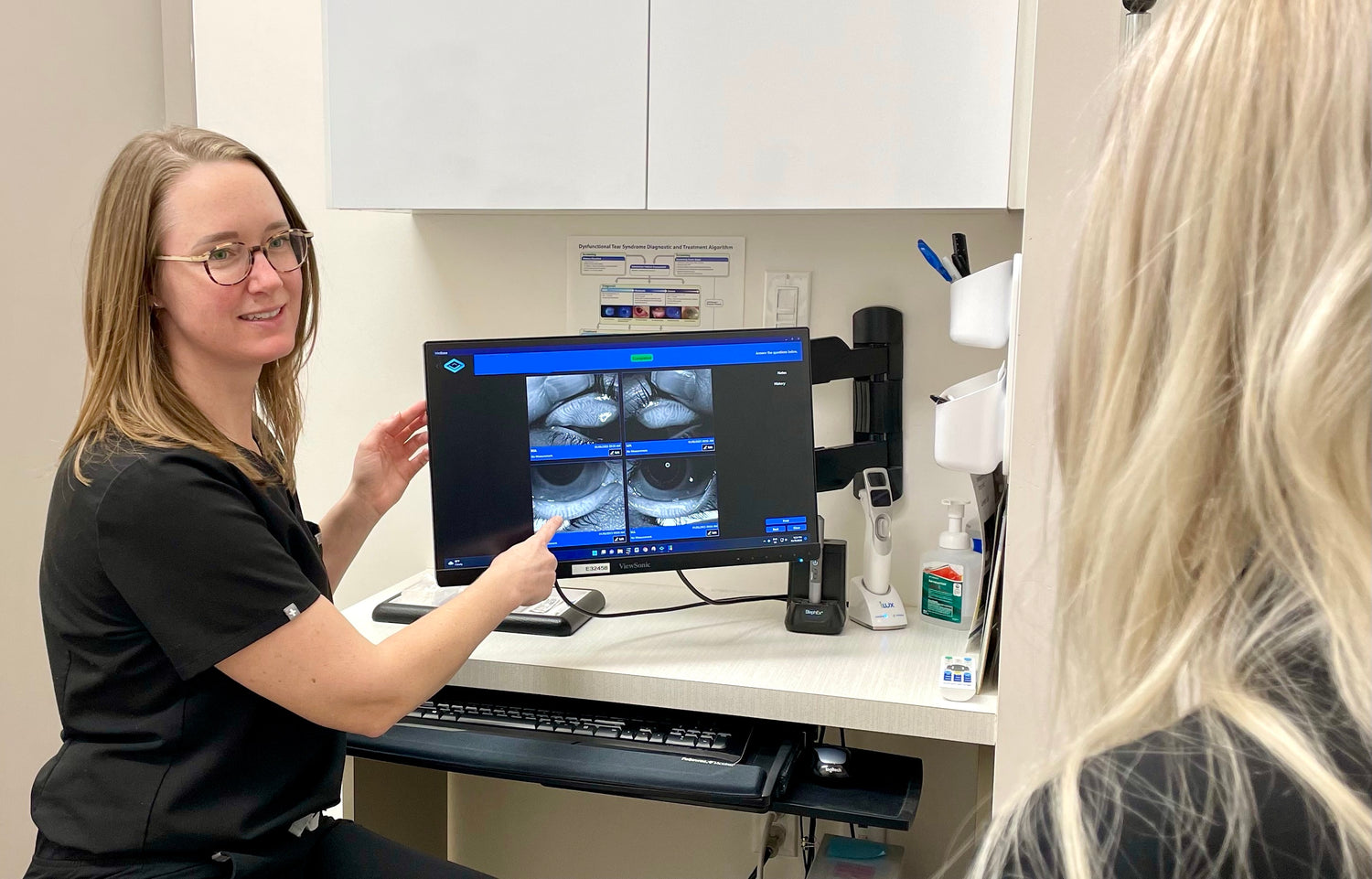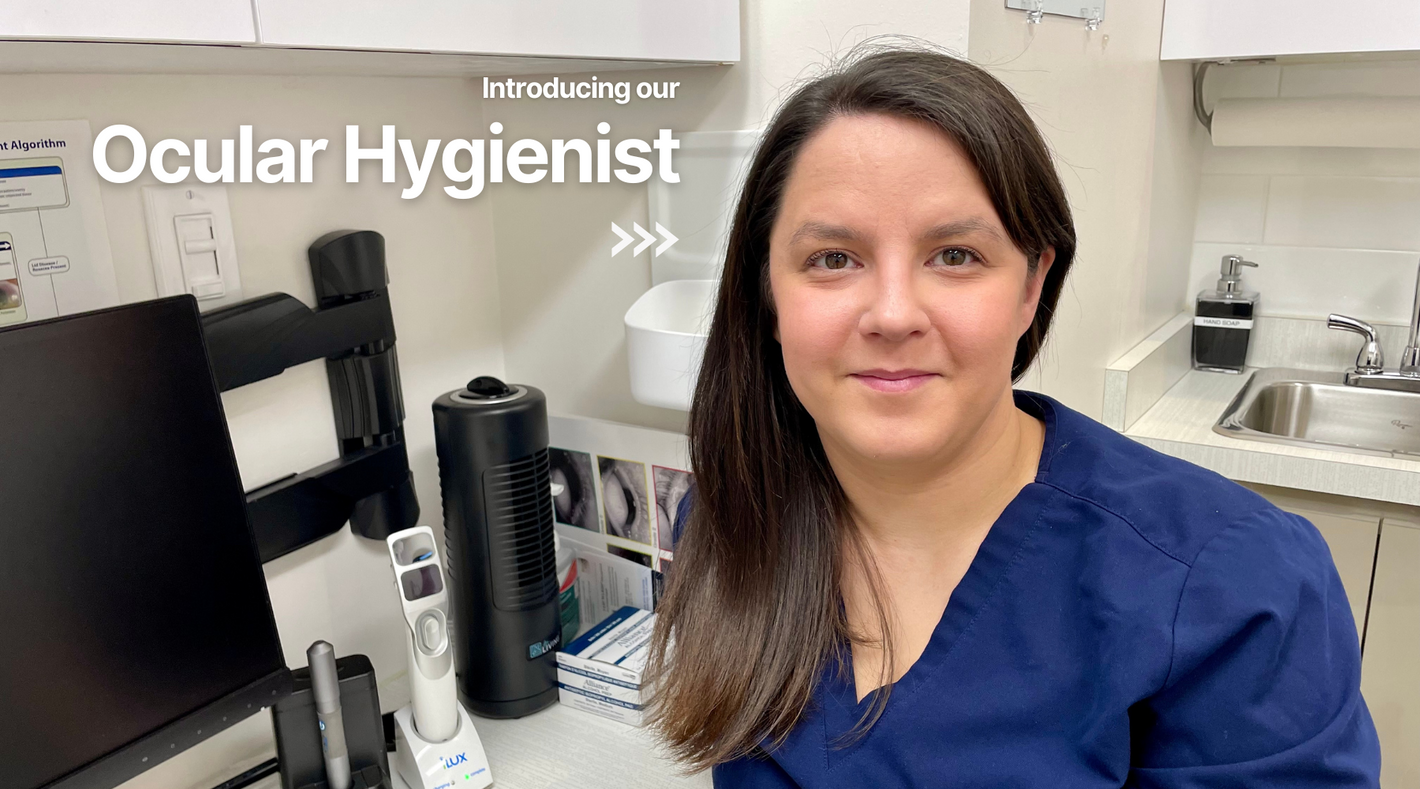Dry Eye Assessment

What is Dry Eye Disease?
Dry Eye Disease is a common problem resulting from your eyes not making enough tears, or the tears not working correctly to hydrate your eye’s surface.
If left untreated, dry eye can cause complications that may compromise your eye health and vision. Our licensed optometrists can help you diagnose, treat, and manage dry eye issues!
Causes and symptoms
Many factors increase the likelihood of someone experiencing dry eye, such as age, gender, environmental conditions, medications, medical conditions, use of screens, and wearing contact lenses.
Dry eye can be short-lived but is often a chronic problem, referred to as Dry Eye Disease. It can leave you feeling very uncomfortable and make doing your daily activities difficult. In severe cases, it can be debilitating.
Symptoms include:
- Stinging or burning
- Redness
- Irritation or gritty feeling as if something is in your eye
- Watering
- Blurred or fluctuating vision
- Eye fatigue or strain
- Excessive blinking or blinking discomfort
- Eye soreness or aching
Evaluation and Treatment for Dry Eye Disease
If you feel you may be experiencing dry eye, please contact our office to book a dry eye assessment appointment.
This evaluation will allow our dry eye specialists to diagnose your dry eye disease and identify the underlying causes. The evaluation consists of measuring the quality and amount of tears on your eyes by microscope with various dyes and checking your tears’ osmolarity (salt concentration).
A doctor will also assess the eyelid and eye structures responsible for tear production and function. Using a specialized camera, called a meibographer, your optometrist will take images of your meibomian glands, the tear oil producing glands inside the eyelids.
All of this will help your optometrist to develop personalized treatment plans for your dry eye disease.
Dry eye disease treatment may include:
- Daily use of a specified artificial tear
- Medicated eye drops
- Oral supplements or medications
- Lifestyle changes
- At-home and in-office lid treatments
- iLux
- Jett Plasma Pen
- BlephEx
- Punctal plugs
- Specialty Contact Lenses such as scleral contact lenses
- Referral for surgical consultation
Dry eye disease cannot be cured, but treatment aims to minimize your symptoms, thus improving your comfort and quality of life. Long-term management will help to maintain your eye health. You and your doctor of optometry will work together to keep your symptoms under control!

Jett Plasma Pen
The Jett Plasma Pen is used to treat a range of medical eye conditions, including dry eyes, blepharitis, meibomian gland dysfunction (MGD), chalazion, demodex, and styes. This Health Canada-approved technology delivers controlled plasma energy with precision, targeting the root causes of discomfort while protecting the delicate structures around the eyes.
Although often applied in cosmetic dermatology, this treatment is focused solely on medical applications that protect and restore eye health. Each session is designed to reduce inflammation, improve tear flow, and restore balance for clearer, more comfortable vision.

Ocular Hygienist
Cassie Smith is a certified Ocular Hygienist, and has been a valuable part of our team since 2016.
Our Ocular Hygienists play a crucial role in managing dry eye symptoms by providing specialized care and guidance. They aide in educating and guiding you toward maintaining optimal eye hygiene, as well as providing treatments under the direction of your optometrist. Click here to find out more about how they can help you.
Book an Appointment
Please note, not all optometrists are available through online booking - for more details, please call or email.
FAQ'S
Why do my eyes burn and tear?
Burning and tearing are often signs of dry eye syndrome, a condition where the eyes don't produce enough quality tears. Ironically, excessive tearing can be your body’s response to ocular surface irritation. At Insight Optometry in Halifax, our licensed optometrists evaluate for causes such as evaporative dry eye, meibomian gland dysfunction, or allergic conjunctivitis.
Why won’t my eyes stop watering?
Persistent tearing may indicate reflex tearing, often a response to chronic dryness, tear film instability, or even blocked tear ducts. We perform detailed evaluations including meibography images and tear breakup time (TBUT) evaluation to identify the cause and offer effective solutions like punctal plugs or moisture-preserving therapies.
Does dry eye cause pain?
Yes. Dry eye disease can lead to sensations of burning, stinging, or grittiness, sometimes even sharp pain. This discomfort stems from inflammation of the ocular surface and insufficient lubrication.
Can dry eyes affect your vision?
Absolutely. Unstable or insufficient tears can cause fluctuating or blurred vision, particularly during screen time or reading. Over time, dry eyes may impact visual acuity and quality of life. Early intervention with tools like artificial tears, omega-3 supplements, or thermal therapies can preserve both comfort and clarity.


